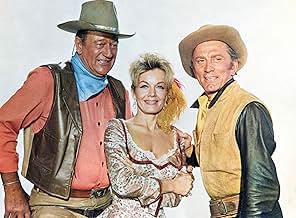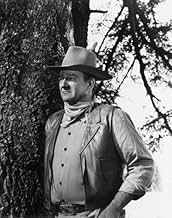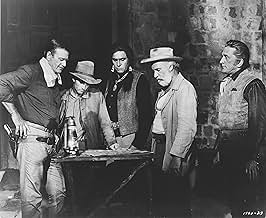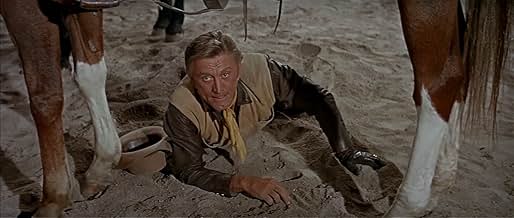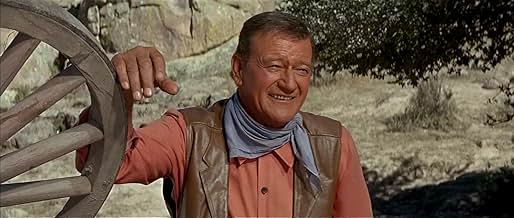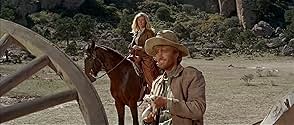NOTE IMDb
6,8/10
12 k
MA NOTE
L'histoire d'un homme qui a été abattu, volé et emprisonné, qui revient voler une grosse cargaison d'or à l'homme qui lui a fait du tort. L'or est transporté dans un carrosse blindé nommé le... Tout lireL'histoire d'un homme qui a été abattu, volé et emprisonné, qui revient voler une grosse cargaison d'or à l'homme qui lui a fait du tort. L'or est transporté dans un carrosse blindé nommé le War Wagon.L'histoire d'un homme qui a été abattu, volé et emprisonné, qui revient voler une grosse cargaison d'or à l'homme qui lui a fait du tort. L'or est transporté dans un carrosse blindé nommé le War Wagon.
- Récompenses
- 1 victoire au total
Robert Walker Jr.
- Billy Hyatt
- (as Robert Walker)
Emilio Fernández
- Calita
- (as Emilio Fernandez)
Boyd 'Red' Morgan
- Early
- (as Red Morgan)
Avis à la une
This is a "caper" film, about what would be a heist in other circumstances. Since the ethics of the perpetrators are those which should have made the authorities make the robbery unnecessary, their act is justified in this situation. This noir western is a bit slick-appearing at some times; but it is physically attractive, has a good cast portraying colorful and somewhat desperate characters, and a strong theme song. Dimitri Tiomkin supplied the very capable score; and Burt Kennedy did a solid job of directing throughout. The very appealing storyline concerns Taw Jackson, played ably by John Wayne, who returns from prison to get back what he can from Bruce Cabot, who stole his ranch and framed him. All he can do is to recruit a group of "mission fighters", beginning with the man who had shot him 5 years earlier, Lomax, played by dynamic Kirk Douglas-and raid the "war wagon"--his enemy's vehicle for transporting gold, a Gatling-Gun-equipped armored stagecoach. Taw's team includes a drunken young dynamite expert he met in prison Robert Walker Jr., Keenan Wynn who is insanely jealous of his young wife, Valora Noland as the wife, Levi Walking Bear in the charismatic person of Howard Keel, his liaison to needed Indian allies, and more. Gene Evans, Joanna Barnes, Ann McRea, Terry Wilson and Frank Mcgrath are among those also doing good professional work in this interesting narrative. Only Noland is a bit weak in this cast. There are some humorous lines and interesting character moments as Wayne assembles his group and plots an attack worthy of "The Dirty Dozen" or "Where Eagles Dare", involving trees that fall at the right moment, Indians faking an attack as a diversion, dynamite used to block off access to a bridge, and a log that swings down and opens the rolling piggy bank violently. What happens after this successful robbery leads to a compromised denouement and ending; but the film is vividly put together, professionally mounted and decently scripted by Clair Huffaker from his own novel. The film stands as a reminder of what any well-made film about an ethical central character can provide relative to any un-ethical and not-fictional man's story competing for a cinema viewer's attention. Moments such as Wayne's visit to his ranch and his talk with the man who stole it, the recruiting of Lomax, the relations of the group, and the raid itself are all memorable. Underrated and always visually interesting.
I generally don't like caper films. Usually, when they end, I'm still waiting for a beginning. This one is much better than usual, largely due to the action packed finale, bawdy humor and a flamboyant performance by Kirk Douglas. Wayne, as Taw Jackson, has an unusual role. Possibly for the first time since TROUBLE ALONG THE WAY, he plays a loser. He's lost his ranch, been shot and falsely imprisoned for three years by Bruce Cabot. How this has happened is never made clear; and one wonders why Wayne seems universally disliked by his former neighbors. Considering his former wealth, one would imagine at least one of his ex-ranch hands would treat him well. Just WHERE are his ranch hands. This is never made clear, and it weakens the believability of the story.
However, the caper is the thing and, whoah, it's a doozie. Getting there is a lot of fun and worth seeing. It's also interesting the cynicism presented her. In one scene, a stablekeeper dismisses Wayne with contempt, while Douglas, a hired killer, is treated with the greatest of respect(!) By 1967, Wayne had come a long way from his denunciation of HIGH NOON for it's unsympathetic, cowardly townspeople.
While not a must see, THE WAR WAGON is very entertaining. I give it a "7".
However, the caper is the thing and, whoah, it's a doozie. Getting there is a lot of fun and worth seeing. It's also interesting the cynicism presented her. In one scene, a stablekeeper dismisses Wayne with contempt, while Douglas, a hired killer, is treated with the greatest of respect(!) By 1967, Wayne had come a long way from his denunciation of HIGH NOON for it's unsympathetic, cowardly townspeople.
While not a must see, THE WAR WAGON is very entertaining. I give it a "7".
I didn't like the "War Wagon" when it was first released, I found it rather silly and vaguely offensive. The problem was me, I was not ready to recognize, let alone relate to, a subtle parody of the western genre. I should have been more receptive because in the mid-60s a huge amount of genre parody began to appear on television ("Batman", 'Wild Wild West", "F- Troop", "Get Smart"), which could be traced back to gently tongue-in-cheek series like "Maverick" and "Zorro".
"Cat Ballou" (1965) was the first feature length parody of Western genre clichés. But its parody elements were obvious, even if you were not that familiar with the conventions of the Western genre you could recognize exaggerations and revisions. In addition, up to this point John Wayne films had given the Western genre only very traditional treatments.
But "The War Wagon" was only the first example of director Burt Kennedy's tweaking of the genre. He would follow it up with "Support Your Local Sheriff" (1969), "Hannie Caulder" (1971), and "Support Your Local Gunfighter" (1971). Wayne would toy with parodic elements two years later with "True Grit", and would stay much less traditional with the remainder of his westerns.
"The War Wagon" is also a genre hybrid as western is mixed with buddy picture and big heist movie. Taw (John Wayne) recruits an old enemy Lomax (Kirk Douglas) as he seeks revenge on a ruthless mine owner (Bruce Cabot) who not only framed and sent to him prison, but appropriated his ranch and personal possessions after a huge gold strike was discovered on ranch property (here we go with the exaggeration-the only things missing are stealing Taw's wife, adopting his children, and leaving his toilet seat up). Cabot transports his gold in a "Wild Wild West" inspired armored wagon.
The interplay between Wayne and Douglas (who always seems right on the verge of accepting Cabot's standing offer of $12,000 to kill Wayne) is clever and sarcastic, working with the many exaggerated elements to provide the film's considerable humor.
"The War Wagon" finds Wayne on the wrong side of established authority, for at least the third time as his Ethan Edwards character in "The Searchers" also operated well outside the law and Quirt Evans in "Angel and the Badman" had to be bad enough that he could be reformed by Gail Russell.
Howard Keel plays the civilized Indian sidekick mostly for comic relief and the characters actually demonstrate an awareness of the movie context when they self-reflexively (deliberately drawing attention to their playing characters in a movie) refer to a tactic as an old Indian trick. Ultimately the joke (and the irony) is on Wayne and Douglas, as their seemingly one-sided deal with the Indians (a few blankets in exchange for their participation) causes the Indians to end up with most the rewards.
"The War Wagon's" understated parody style would inspire John Huston ("The Life & Times Of Judge Roy Bean") and George Roy Hill ("The Sting"); and of course many others.
Then again, what do I know? I'm only a child.
"Cat Ballou" (1965) was the first feature length parody of Western genre clichés. But its parody elements were obvious, even if you were not that familiar with the conventions of the Western genre you could recognize exaggerations and revisions. In addition, up to this point John Wayne films had given the Western genre only very traditional treatments.
But "The War Wagon" was only the first example of director Burt Kennedy's tweaking of the genre. He would follow it up with "Support Your Local Sheriff" (1969), "Hannie Caulder" (1971), and "Support Your Local Gunfighter" (1971). Wayne would toy with parodic elements two years later with "True Grit", and would stay much less traditional with the remainder of his westerns.
"The War Wagon" is also a genre hybrid as western is mixed with buddy picture and big heist movie. Taw (John Wayne) recruits an old enemy Lomax (Kirk Douglas) as he seeks revenge on a ruthless mine owner (Bruce Cabot) who not only framed and sent to him prison, but appropriated his ranch and personal possessions after a huge gold strike was discovered on ranch property (here we go with the exaggeration-the only things missing are stealing Taw's wife, adopting his children, and leaving his toilet seat up). Cabot transports his gold in a "Wild Wild West" inspired armored wagon.
The interplay between Wayne and Douglas (who always seems right on the verge of accepting Cabot's standing offer of $12,000 to kill Wayne) is clever and sarcastic, working with the many exaggerated elements to provide the film's considerable humor.
"The War Wagon" finds Wayne on the wrong side of established authority, for at least the third time as his Ethan Edwards character in "The Searchers" also operated well outside the law and Quirt Evans in "Angel and the Badman" had to be bad enough that he could be reformed by Gail Russell.
Howard Keel plays the civilized Indian sidekick mostly for comic relief and the characters actually demonstrate an awareness of the movie context when they self-reflexively (deliberately drawing attention to their playing characters in a movie) refer to a tactic as an old Indian trick. Ultimately the joke (and the irony) is on Wayne and Douglas, as their seemingly one-sided deal with the Indians (a few blankets in exchange for their participation) causes the Indians to end up with most the rewards.
"The War Wagon's" understated parody style would inspire John Huston ("The Life & Times Of Judge Roy Bean") and George Roy Hill ("The Sting"); and of course many others.
Then again, what do I know? I'm only a child.
Solid entertainment in the Wayne style, as John and Kirk team up to liberate a gazillion bars of gold from Bruce Cabot, the man who stole Wayne's ranch and goldmine. John Wayne is in fine form as usual; Kirk is equally fine as the hired gun who is willing to doublecross Cabot. Kirk shows a fine comic ability as he taunts both Cabot and Wayne. You can tell he's having a good time in the film; each time he grins it makes me laugh.
Keenan Wynn is pretty unlikable as one of Cabot's men who is on Wayne's side, but then his character is supposed to be unlikable. Robert Walker Jr. is nervous and unsure as the explosives expert that Wayne met in prison. Howard Keel is new to the John Wayne guild, but he's a welcome addition. Always a great comic actor, he is wonderful as Wayne's indian friend who continually needs to be rescued from his own ineptitude. Bruce Dern has a juicy but small role as one of Cabot's hired guns; he throws big toothy grins about and has a lot of fun with his job.
Pure action entertainment, and also a lot of fun. Pick up this film on the new DVD widescreen version; it's a great way to watch it.
Keenan Wynn is pretty unlikable as one of Cabot's men who is on Wayne's side, but then his character is supposed to be unlikable. Robert Walker Jr. is nervous and unsure as the explosives expert that Wayne met in prison. Howard Keel is new to the John Wayne guild, but he's a welcome addition. Always a great comic actor, he is wonderful as Wayne's indian friend who continually needs to be rescued from his own ineptitude. Bruce Dern has a juicy but small role as one of Cabot's hired guns; he throws big toothy grins about and has a lot of fun with his job.
Pure action entertainment, and also a lot of fun. Pick up this film on the new DVD widescreen version; it's a great way to watch it.
Take the idea of gold shipment transported by an impenetrable vehicle, armored, armed and escorted by a team of armed guards. Your goal, rob it.
Sounds like another bank job/caper flick starring Nick Cage or taking place in Vegas? Sure! But, make it an old time western, then cast John Wayne, Kirk Douglas, Bruce Cabot, Bruce Dern, Keenan Wynn and Howard Keel as a Jewish Indian and you have the makings of a classic.
The War Wagon, complete with catchy title tune, is another notch in the Duke's gun for being dead on target for what his fans crave: A solid, stoic hero, framed, robbed of all his possessions and jailed by an evil banker (Cabot), he is released and vows revenge by stealing his regular gold dust shipment. The problem is that the gold is transported in the title vehicle, an armored stagecoach with gattling gun mounted on top; an unstoppable juggernaut escorted by two teams of riflemen and riders. Throw in Kirk Douglas as an old friend who's been hired to kill him, a drunken, shaky nitro expert, played by the ever pre-pubescent looking Robert Walker Jr., a half Jewish/Half-Indian compadre (Howard Keel), a bitter, miserly thief (Keenan Wynn), his young, enslaved wife (a luminescent Joanna Barnes, also a "Spartacus" alumni)), toss in typical Western scum like Bruce Dern, and you have a high adventure caper flick that will keep you entertained for the length of the picture.
The on-screen magic of Wayne and Douglas is never in better form than here, with all the usual hijinks the stars can pack into this epitome of the Saturday Matinee Action movie before they became techo-terrors of dueling visual effects.
Sounds like another bank job/caper flick starring Nick Cage or taking place in Vegas? Sure! But, make it an old time western, then cast John Wayne, Kirk Douglas, Bruce Cabot, Bruce Dern, Keenan Wynn and Howard Keel as a Jewish Indian and you have the makings of a classic.
The War Wagon, complete with catchy title tune, is another notch in the Duke's gun for being dead on target for what his fans crave: A solid, stoic hero, framed, robbed of all his possessions and jailed by an evil banker (Cabot), he is released and vows revenge by stealing his regular gold dust shipment. The problem is that the gold is transported in the title vehicle, an armored stagecoach with gattling gun mounted on top; an unstoppable juggernaut escorted by two teams of riflemen and riders. Throw in Kirk Douglas as an old friend who's been hired to kill him, a drunken, shaky nitro expert, played by the ever pre-pubescent looking Robert Walker Jr., a half Jewish/Half-Indian compadre (Howard Keel), a bitter, miserly thief (Keenan Wynn), his young, enslaved wife (a luminescent Joanna Barnes, also a "Spartacus" alumni)), toss in typical Western scum like Bruce Dern, and you have a high adventure caper flick that will keep you entertained for the length of the picture.
The on-screen magic of Wayne and Douglas is never in better form than here, with all the usual hijinks the stars can pack into this epitome of the Saturday Matinee Action movie before they became techo-terrors of dueling visual effects.
Le saviez-vous
- AnecdotesDuring the production, Kirk Douglas was late to the set because he was shooting a commercial endorsement for the Democratic Governor of California, Edmund G. Brown. John Wayne was furious, and was late to work the next day because he was shooting a commercial for the Republican candidate Ronald Reagan.
- GaffesWhen the gold wagon crashes it stops with it's right side wheels up. When Taw gets to it, it has it's left side wheels in the air.
- ConnexionsFeatured in The Dick Cavett Show: Kirk Douglas (1971)
Meilleurs choix
Connectez-vous pour évaluer et suivre la liste de favoris afin de recevoir des recommandations personnalisées
- How long is The War Wagon?Alimenté par Alexa
Détails
Box-office
- Montant brut aux États-Unis et au Canada
- 11 990 000 $US
- Durée1 heure 41 minutes
- Rapport de forme
- 2.35 : 1
Contribuer à cette page
Suggérer une modification ou ajouter du contenu manquant

Lacune principale
By what name was La caravane de feu (1967) officially released in India in English?
Répondre


